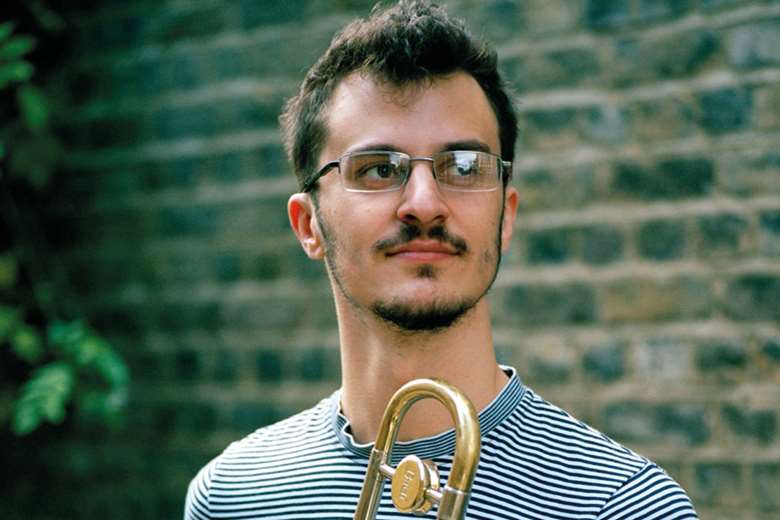Taking Off: Raph Clarkson
Selwyn Harris
Thursday, July 11, 2024
Informed as much by the ‘organised chaos’ of Keith Tippett as the folksiness of John Taylor, Raph Clarkson has forged a bold musical outlook. Selwyn Harris spoke to the trombonist about how everything's coming together in his South African-inspired group Equal Sprits

Sometimes it’s best to start right from the very beginning and locate those initial sparks of inspiration that are still getting the creative juices flowing today. Certainly that’s the case with the 35-year-old trombonist-composer Raph Clarkson.
“I feel very lucky,” he says, speaking to me in the small library of the Marylebone Theatre hours before a concert presented by Action for South African (ACTSA) of his band Equal Spirits. “I was a child to two classical musicians: my mum was a baroque violinist, my dad was a viola player. So there was always music in the house so I’d have to credit them. When I picked up the trombone at age eight my mum would practise with me. Also both of my parents taught at Dartington International Summer School and you could join any of the music making which was a mixture of amateurs, semi-professionals, professionals, students. Keith Tippett ran his jazz band there with his wife Julie so I went along, hardly able to play anything aged eight for the next three or four years. I think that was hugely formative because we were playing Keith’s music. He was putting combos of free improvisers together.”
Clarkson’s connections to the British jazz lineage run deep, especially with the first and subsequent generation of British musicians that broke from the American tradition from the mid-1960s.
“I was at school with Tommy Laurence who’s [bassist] Chris Laurence’s son,” he says. “He gave me my first jazz CDs: Atomic Mr Basie and JJ Johnson was the first jazz trombonist that I listened to a lot. The other big one that came up was John Taylor, when I went to York University and that was hugely inspirational. He was very worshipful of his contemporaries so he presented that music to us and I fell in love with that whole Ralph Towner, Kenny Wheeler, Stan Sulzmann, Azimuth trio thing, some of my first major jazz and improvisational music influences. There’s a sort of folkiness to John Taylor and that European/British kind of jazz but also what stuck with me from Keith [Tippett] at that very early point was the love of organised chaos for want of a better term.”
That tension between anarchy and order is palpable throughout the collective dialogue that’s at the heart of both Clarkson’s orchestral projects: The Dissolute Society and Equal Spirits. He is though perhaps better known for playing trombone with Dave Morecroft’s World Service Project (WSP) having hooked up with Morecroft at York Uni too. WSP were one of a handful of bands that invigorated new-millennium Brit-jazz with a renewed avant-punk energy.
“It was at York that I also first heard live Polar Bear, becoming aware of that Brit Jazz, proggy thing. Acoustic Ladyland, Trio VD and then Led Bib via [bassist] Liran Donin who produced my first Dissolute Society album. I listened to Rage Against the Machine massively as a teenager, heavy funky, proggy-riffs with jazz and free chaotic improvising was super exciting and Match and Fuse stuff brought WSP into contact with a lot of other European bands. It was an exciting time for sure.”
In 2018 Clarkson formed his 8-12 piece ensemble The Dissolute Society finally plucking up the courage to make a statement as bandleader (“I have some lack of confidence about putting myself out the front and the idea of being in a group where there’s lots of voices felt safer.”) The band recorded a trio of albums embracing an accessibly left-field sonic palette of Taylor/Wheeler-type ECM chamber jazz and avant-garde elements with an array of human voices from children’s choirs through to song/spoken word.
“The Dissolute Society was firstly an enjoyment of collaborating with different people,” he says. “Part of that was also wanting to do something that involved strings and brass so combining different soundworlds. It was a story about personal grief turning into hope. Words gives the anchor where the music might be at one point completely free.”
During this period Clarkson, with support from Help Musicians UK and ACTSA, travelled across South Africa collaborating with various musicians and synthesizing them with disparate elements, including Elliot Galvin’s sampling/electronica and string parts, back in the UK. Equal Spirits, says Clarkson owes a great deal to the Grammy-nominated producer Sonny Johns (Hugh Masekela, Tony Allen) who organically wove these threads together, creating a rousing contemporary-edged homage to the giants of South African jazz.
“My love of South African jazz came from one of my earliest memories sitting in Keith [Tippett]’s band who’d collaborated with people like Mongezi Feza, Harry Miller and Dudu Pukwana,” he says. “I remember a tune of his where we chanted Mongezi Feza’s name and played his tunes. As a teenager I went to some of Keith’s’ gigs in London with Louis Moholo. But also there was a fantastic sax player Dafydd Williams coming out of Uni who asked me to play South African jazz classics in a band and we did some gigs where I met Adam Glasser who played keys and harmonica. Also Chris Bachelor was a visiting teacher in York and did a Brotherhood of Breath project. So this music was always very much in the consciousness.”
This article originally appeared in the August 2024 issue of Jazzwise. Never miss an issue – subscribe to Jazzwise today





